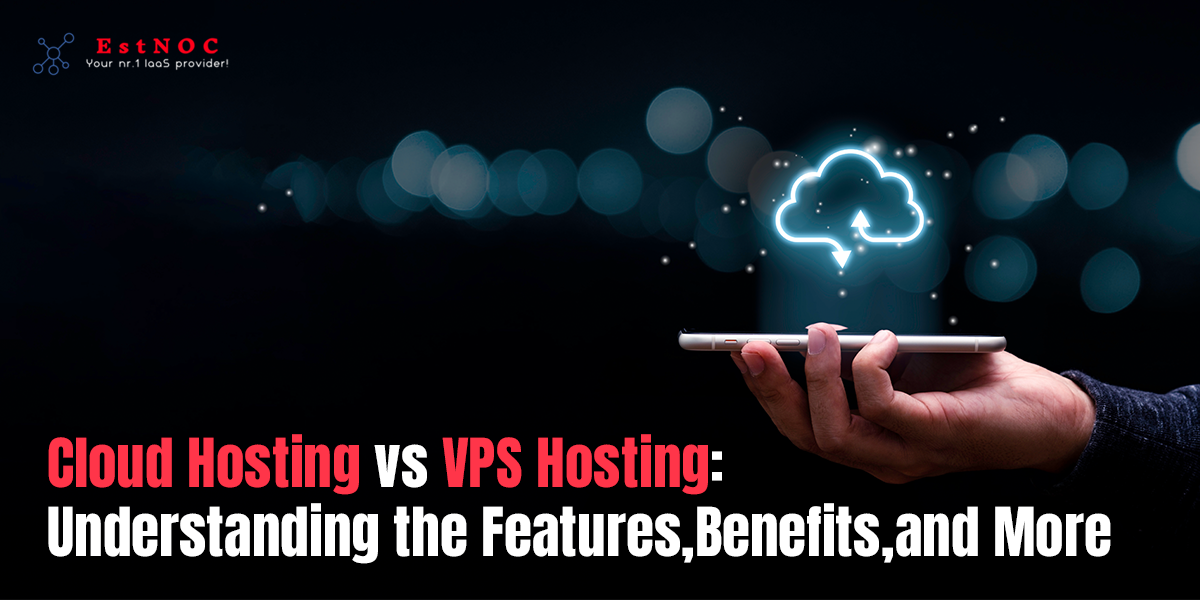10 Strategies for Optimizing....
In the ever-evolving..
By Admin / 13 February

In a world where everything is happening with just one click, people need their websites to be quick as well. Websites with slow loading times and persistent downtime are not preferable to anyone. As websites are the main source of your online business these days, they must be accessible to everyone without hassle.
Therefore, for quick and 24/7 easy access to the websites, here comes the web hostings. Web hosting improves the load time, lowers the downtime, and offers a plethora of benefits. However, in the technological market, we have a myriad of options to choose from.
From the bunch, we will today talk about Cloud Hosting and VPS Hosting. Both hosting options are unique and have different features. People misunderstood the difference many times.
So, to give you crystal clarity about these hosting options, we are here with this complete guide for you.
Cloud Hosting utilizes a distributed network of virtual servers interconnected through the internet. These servers dynamically allocate computing power and storage resources as needed, offering scalability and flexibility for businesses to meet fluctuating demands effectively.
One of the most significant advantages of Cloud Hosting is its scalability. Resources can be scaled up or down instantly based on demand, ensuring optimal performance during traffic spikes without the need for manual intervention. This scalability feature makes Cloud Hosting ideal for websites experiencing unpredictable traffic patterns.
Cloud Hosting offers high availability by distributing resources across multiple servers. If one server fails, another takes over seamlessly, minimizing downtime and ensuring uninterrupted service. This redundancy ensures reliability, crucial for mission-critical websites and applications.
With Cloud Hosting, you only pay for the resources you use, making it a cost-effective solution for businesses of all sizes. Additionally, there's no need to invest in expensive hardware or worry about maintenance costs, as the infrastructure is managed by the hosting provider.
Cloud Hosting provides flexibility in terms of configuration options and customization. Users can easily adjust resources, add or remove features, and integrate third-party services to meet their specific requirements. This flexibility empowers businesses to adapt to evolving needs and technological advancements seamlessly.
Cloud Hosting typically offers robust security measures, including firewalls, encryption, and regular backups. Hosting providers invest in advanced security protocols and compliance standards to safeguard data and protect against cyber threats, ensuring peace of mind for businesses and their customers.
VPS Hosting partitions a single physical server into multiple virtual servers, each functioning independently with its allocated resources and operating system. This segmentation ensures enhanced privacy, security, and performance for individual users' applications and websites.
VPS Hosting provides a higher level of isolation compared to shared hosting, ensuring that resources are not shared among multiple users. This isolation enhances security and performance, as users have full control over their virtual environment without interference from neighboring accounts.
With VPS Hosting, users have root access to their virtual server, allowing them to install custom software, configure settings, and optimize performance according to their preferences. This level of customization is beneficial for businesses with specific software requirements or specialized applications.
VPS Hosting offers better performance than shared hosting, as resources are dedicated to each virtual server. This translates to faster loading times, improved website responsiveness, and enhanced user experience, especially for resource-intensive websites or applications.
While not as resilient as Cloud Hosting, VPS Hosting still provides a reliable hosting solution with minimal downtime. Since resources are allocated to individual virtual servers, performance issues or traffic spikes on one server do not affect others, ensuring consistent performance for your website.
VPS Hosting strikes a balance between shared hosting and dedicated hosting in terms of cost. While it may be slightly more expensive than shared hosting, it offers significant performance and security benefits at a fraction of the cost of dedicated hosting, making it a cost-effective choice for growing businesses.
Beyond the core features and benefits, there are additional factors to consider when choosing between Cloud Hosting and VPS Hosting:
Cloud Hosting typically requires less technical expertise, as the infrastructure is managed by the hosting provider. In contrast, VPS Hosting may require more hands-on management, especially for server maintenance and updates.
Consider your website's traffic patterns and growth projections. If you anticipate significant fluctuations in traffic or rapid growth, Cloud Hosting's scalability may be more suitable. However, if your traffic is relatively stable and predictable, VPS Hosting may offer sufficient performance and cost savings.
Evaluate any regulatory or compliance requirements specific to your industry. Some industries, such as healthcare or finance, have strict data security and compliance standards that may influence your choice of hosting solution.
Assess the level of support and service level agreements (SLAs) offered by the hosting provider. Ensure that they provide reliable technical support and guaranteed uptime to minimize disruptions to your website's operations.
In summary, both Cloud Hosting and VPS Hosting offer unique features and benefits tailored to different business needs. Cloud Hosting provides scalability, high availability, and cost efficiency, making it ideal for dynamic workloads and mission-critical applications. On the other hand, VPS Hosting offers isolation, customization, and better performance than shared hosting at a reasonable cost, making it suitable for businesses with specific requirements and moderate traffic levels.
Ultimately, the choice between Cloud Hosting and VPS Hosting services depends on your business goals, budget, and technical requirements. By understanding everything about each hosting solution, you can make an informed decision that aligns with your website's needs and growth strategy.
As a leading provider of hosting solutions, Estnoc offers a range of Cloud Hosting and VPS Hosting options tailored to your business requirements. Contact us today to learn more about our hosting services and find the perfect solution for your website.